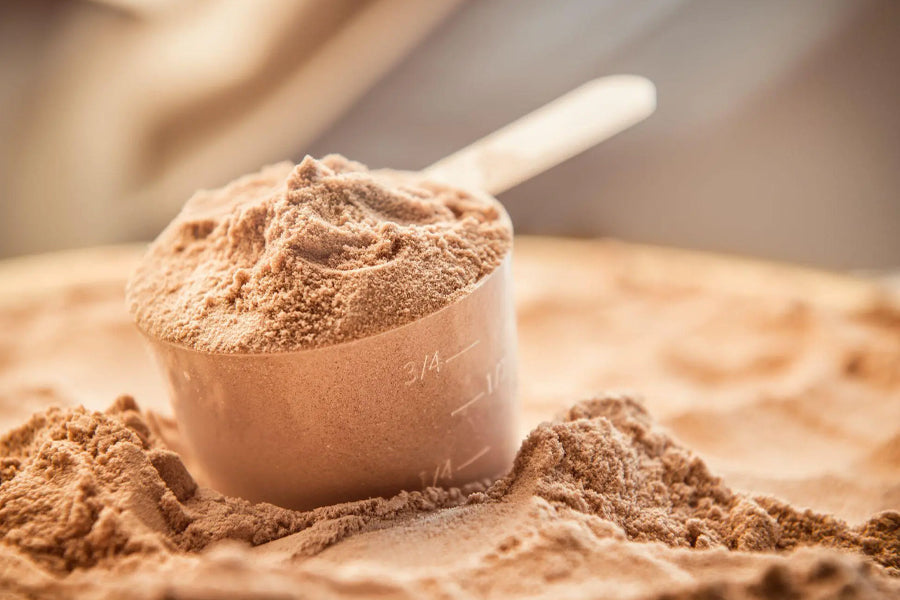What is Whey Protein?

Whey is a cow milk protein. Cow milk has two proteins; casein and whey. Whey accounts for 20% of the total milk protein content. The rest of the 80% is from casein. It is a protein that you obtain during the cheese-making process. Whey is in the watery part of the milk. The liquid you see on top of the yogurt container is whey. Most cheesemakers discard that liquid before discovering its commercial value.
In terms of taste, it does not have any, but you can find several artificial flavored whey protein supplements. You have probably seen whey protein in powder form. Shakes, drinks, and protein bars also contain some quantity of whey protein. Whey protein is one of the high-quality protein workout supplements having multiple benefits.
Why Do You Need Whey Protein Supplement?
It is an essential workout supplement for bodybuilders, gym-goers, and people who want to lose weight. Whey is very easily digested once you consume it. Then, it gets absorbed into your digestive system. From the digestive system, it enters the bloodstream. The protein reaches your muscles and starts the rebuilding and recovery of the body after an intense workout.
According to ISSN, a whey protein supplement is preferred over other types because it gives the maximum number of amino acid content (9 essential amino acids). If your protein intake is low, taking a whey protein supplement will fulfill the deficit. So, incorporating different types of whey protein in your diet makes a huge difference if you have just started your fitness journey.
Related Article: 5 Things You Should Keep in Mind When Taking Whey Protein
Types of Whey Protein Supplements
There are three types of whey protein. Isolate, concentrate, and hydrolysate. Each of them is processed through different methods and has different nutritional values. Isolate and concentrate are mainly used and seen in the market. However, all three types have pros and cons.
Whey Isolate

After processing, whey protein is broken down into two forms. Isolate contains 85-90% of the protein content, and concentrate has 80% protein content. Whey isolate is further processed to purify and remove extra carbohydrates and fats. It has more protein content than the concentrate type. However, whey isolate has a minimal amount of macro and micronutrients. Most of such nutrients get destroyed during processing.
The Whey Protein Isolate by DMoose contains 90% pure form of proteins that are easily digested and help quick muscle recovery. It has 5.1 g BCCAs (branched-chain amino acids) and 2.8 g leucine. Also, it is gluten-free with no hormones and soy. There are digestive enzymes in the product that will help quick digestion. You can use whey isolate before or after a workout; it's up to you!
Whey Concentrate

Concentrate whey is often less expensive and easier to locate because it is pretty famous for various reasons. Whey protein by DMoose is a safer protein powder since it goes through fewer procedures than other whey proteins. It includes macro and micronutrients necessary for fat burning. The whey protein has natural flavoring and is the highest calorie-dense supplement available. Although isolate whey has a higher protein content, concentrate whey is safer. Whey protein powder provides nutritional benefits in addition to improved muscle recovery, performance, and gain in muscle mass.
The whey protein has digestive enzymes blend and does not contain any fillers, soy, or hormones. It can be safely used as a pre and post-workout supplement.
Whey Hydrolysate
Well, whey protein hydrolysate can be an isolate or a concentrate. The benefit is that it is digested more rapidly in the stomach. It is because, during its processing, the manufacturers purposely break down the amino bonds. You receive the fastest protein intake after hydrolysis, which virtually works as a pre-digestion step. That usually translates to a much faster rate of muscle repair.
On the other hand, hydrolysate may not always have all of the naturally present nutrients that concentrate provides. Besides, hydrolysate, considering the high cost, has poor taste.
Related Article: Top 7 Benefits of Whey Protein Powder
What are the Benefits of Whey Protein Supplement?

There are multiple benefits of whey protein supplements, be it muscle growth or weight loss. Some of the amazing benefits are down below:
- Whey protein is helpful in weight loss, as per research, because whey promotes fat loss. It not only boosts metabolism but also suppresses appetite.
- It is effective against various age-related muscle loss and increasing strength.
- It has Vitamin A, Vitamin C, and other nutrients that boost your immunity.
- Whey protein supplements lower your blood pressure, cholesterol, and sugar level.
- This protein supplement promotes muscle growth and forms lean body mass because of the presence of BCAAs and leucine.
- The whey protein supplement reduces C-reactive protein (CRP), which causes inflammation. As a result, after a workout, it reduces the risk of inflammation of muscles.
- Because of bioactive milk peptides, whey protein improves sleep and reduces stress.
- Whey protein has a high level of cysteine, which is significant in boosting your antioxidant defenses.
There may be some other advantages of using whey protein supplements as well. But, let’s move forward to the possible side effects of the product now.
Are There Any Side Effects of Whey Protein Supplement?

Whey is generally a safe protein supplement. You can use whey without any hesitation according to the recommended dosage. But, if you over consume it, it can cause severe issues in the body.
As per a review study, long-term use of whey protein supplements without professional guidance can harm your vital organs, including the kidneys and liver. Also, it can provoke aggression and acne in the users.
Overdosage of whey protein supplements leads to bloating, headache, nausea, and thirst. Also, if you are lactose-intolerant, consult your doctor before taking whey protein supplements. However, you can choose whey protein isolate instead of whey protein concentrate. The primary reason is that whey isolate is more refined and has fats/lactose in lesser amounts.
Related Article: Whey Protein: Health Benefits, Side Effects, and Precautions
What is the Recommended Dosage for Beginners?
There are three types of whey protein usually available on the market; you may think they have different dosages. The daily recommended dose of all three is the same. It is 1-2 scoops or 0.88-1.76 ounces daily. Whey protein is preferably a post-workout supplement. It means taking it after a workout is more beneficial than before. Some people take it as a pre-workout supplement as well.
Here is the usage detail for each type of whey protein supplement for beginners:
- Isolate- It is perfect for you if your goal is developing lean muscle mass or if you are in the cutting phase. DMoose Whey Isolate is highly recommended if you want a low-carb but protein-rich supplement.
- Concentrate- This type is ideal for mass gain and fat loss. If you wish to get a custom-made powder, you can. You can take it after a workout with some essential nutrients.
- Hydrolysate- If your focus is taking isolate in its purest form, then going for whey hydrolysate would be ideal. You can either take it during an intense workout session or after it. However, it is much more suitable for professional or advanced bodybuilders.
The Bottom Line
Whey protein supplement is one of the highest-quality protein products. Your body can absorb and utilize it quickly and it is perfect for post-workout recovery, lean muscle mass, fat loss, and muscle gain. Though whey protein has some side effects, consuming it within the suggested limit can do nothing wrong.
Whey protein supplement is more suitable as compared to other protein supplements, especially for beginners because it contains essential amino acids. If your target is gaining lean muscle mass, go for it. However, you must always check the ingredients of the product to choose the one that meets your body requirements.
Reading List
Top 7 Proven Ways to Go from Lean to Muscular
5 Most Important Tips to Start Your Fitness Journey
Every Lifter Should Know These 7 Facts About Essential Amino Acids
Article Sources
- Gangurde, HemantH, et al. “Whey Protein.” Scholars’ Research Journal, vol. 1, no. 2, 2011, p. 69. org (Crossref), https://doi.org/10.4103/2249-5975.99663.
- Hulmi, Juha J., et al. “Effect of Protein/Essential Amino Acids and Resistance Training on Skeletal Muscle Hypertrophy: A Case for Whey Protein.” Nutrition & Metabolism, vol. 7, no. 1, 2010, p. 51. org (Crossref), https://doi.org/10.1186/1743-7075-7-51.
- Kimball, Scot R., and Leonard S. Jefferson. “Signaling Pathways and Molecular Mechanisms through Which Branched-Chain Amino Acids Mediate Translational Control of Protein Synthesis.” The Journal of Nutrition, vol. 136, no. 1 Suppl, Jan. 2006, pp. 227S-31S. PubMed, https://doi.org/10.1093/jn/136.1.227S.
- Paddon-Jones, Douglas, and Blake B. Rasmussen. “Dietary Protein Recommendations and the Prevention of Sarcopenia.” Current Opinion in Clinical Nutrition and Metabolic Care, vol. 12, no. 1, Jan. 2009, pp. 86–90. PubMed, https://doi.org/10.1097/MCO.0b013e32831cef8b.
- Pennings, Bart, et al. “Whey Protein Stimulates Postprandial Muscle Protein Accretion More Effectively than Do Casein and Casein Hydrolysate in Older Men.” The American Journal of Clinical Nutrition, vol. 93, no. 5, May 2011, pp. 997–1005. PubMed, https://doi.org/10.3945/ajcn.110.008102.
- Publication : USDA ARS. https://www.ars.usda.gov/research/publications/publication/?seqNo115=209388. Accessed 26 Mar. 2022.
- Smithers, Geoffrey W. “Whey and Whey Proteins—From ‘Gutter-to-Gold.’” International Dairy Journal, vol. 18, no. 7, July 2008, pp. 695–704. ScienceDirect, https://doi.org/10.1016/j.idairyj.2008.03.008.
- Vasconcelos, Quezia Damaris Jones Severino, et al. “Whey Protein Supplementation and Its Potentially Adverse Effects on Health: A Systematic Review.” Applied Physiology, Nutrition, and Metabolism = Physiologie Appliquee, Nutrition Et Metabolisme, vol. 46, no. 1, Jan. 2021, pp. 27–33. PubMed, https://doi.org/10.1139/apnm-2020-0370.
- Westerterp-Plantenga, M. S., et al. “Dietary Protein, Weight Loss, and Weight Maintenance.” Annual Review of Nutrition, vol. 29, 2009, pp. 21–41. PubMed, https://doi.org/10.1146/annurev-nutr-080508-141056.
- Zhou, Ling-Mei, et al. “Effect of Whey Supplementation on Circulating C-Reactive Protein: A Meta-Analysis of Randomized Controlled Trials.” Nutrients, vol. 7, no. 2, Feb. 2015, pp. 1131–43. PubMed, https://doi.org/10.3390/nu7021131.








